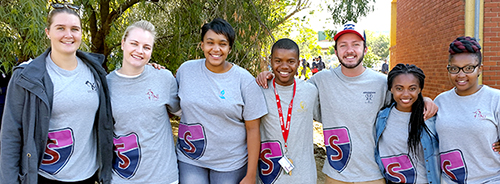Latest News Archive
Please select Category, Year, and then Month to display items
02 January 2025
|
Story Gerda-Marie van Rooyen
|
Photo Supplied
 Leading the research in South Africa is Prof Linus Franke from the Department of Soil, Crop and Climate Sciences.
Leading the research in South Africa is Prof Linus Franke from the Department of Soil, Crop and Climate Sciences.
Scientists are actively pursuing the successful breeding of diploid hybrid potatoes from inbred lines. This is expected to revolutionise potato breeding as it holds the key to rapid genetic progress. It will introduce new varieties for commercialisation through seed. Currently, existing potato variants have a gene that renders self-pollinated seeds infertile.
Prof Linus Franke, an academic in the Department of Soil, Crop and Climate Sciences at the UFS, is leading the research in South Africa. “This technology allows the production of genetically uniform potato seed that is easy to transport and largely disease-free.” He says this differs from conventional breeding whereby only vegetative propagation is possible due to tetraploid varieties in potatoes. It also risks carrying pests and diseases from one generation to the next – leading to the accumulation of pests and diseases with each round of multiplication.
Seed innovation
Prof Franke explains that Solynta BV, a seed company based in the Netherlands that produces potato varieties that can be grown from seed, has included South Africa in their research efforts because it is one of Africa’s largest producers and exporters. Through his academic relationship with Wageningen University and Research, a Dutch institution renowned for its agricultural endeavours and food production, the UFS became involved in researching hybrid potatoes grown from seed.
Diploid seeds containing two sets of chromosomes allow easier gene manipulation to increase predictability and speedier genetic progress. The breeding approach enables the incorporation of tolerance to pests, diseases, abiotic stresses (cold, heat, drought) and other desired genetic traits.
Although Prof Franke is optimistic about this research, he is not blind to disadvantages. “Potato seeds are tiny and have little energy reserves, making it harder to grow potatoes from seed than from tubers.” He says potatoes from seed will take longer to cultivate than tubers, as farmers need to grow plantlets from seeds first, adding six weeks to the growing period. “It is possible that commercial farmers can grow potatoes directly from seed. Alternatively, perhaps more likely, specialised growers will produce tubers of potatoes from seed; these tubers are then sold as seed tubers to other potato farmers, who then continue their normal practices of producing potatoes for the market from tubers.”
Financial benefits
Prof Franke says farmers have reason to get excited. “Seed potatoes will reduce input costs, as varieties with enhanced tolerance to pests and diseases require less pesticides. Planting one hectare of potatoes requires three to four tonnes of potato tubers, but only one 25 g packet of potato seeds.” Since potatoes are a more valuable commodity than maize, this technology might also increase farmers’ income potential.
Colleges build community through Academic School Projects
2016-06-13
 The South College leadership visited CommTech Secondary School as part of their academic
The South College leadership visited CommTech Secondary School as part of their academic
community engagement project. From left is Alexanne Ridge, Wilmie van der Wal, Edith Le Roux,
Tuli Molebalwa, Jean-Claude Naude, Mbali Skosana and Lerato Bale.
Photo: Eddie de Wet.
Residence Life at the University of the Free State (UFS), in collaboration with the Community Engagement office, decided to pilot a School Project within colleges for 2016.
The aim of the project is to invest in, and have impact on, not only schools and the learning environment, but also the volunteering spirit of college members. The project triggers critical and reflective thinking as well as the creativity aspect of development to contribute ultimately to our social responsibilities.
Each college will visit a school throughout the year, to serve its academic needs, and to foster relationships in the broader community. Recently, North College visited Bainsvlei High School in Bloemfontein to share information and success stories about academic life as a Kovsie student. At CommTech Secondary School in the city, South College delivered sponsored tables and chairs to improve the overall learning environment.
North College consists of Madelief, Tswelopele, Vergeet-My-Nie, Veritas, and Welwitschia residences while South College includes Armentum, Emily Hobhouse, Marjolein, Kestell, NJ van der Merwe, and Villa Bravado.
“It is a great opportunity for college members to interact with the community, and it serves as motivation for the learners. The learners were very enthusiastic about our visit, and I trust that the South College students will motivate them to complete their high-school career and join us at UFS”, said Wilmie van der Wal, College Coordinator.
The projects will continue during the second semester with the different colleges. Everyone can look forward to significant life-changing stories. A quote by Archbishop Desmond Tutu serves as motivation in this regard: “Do your little bit of good where you are; it’s those little bits of good put together that overwhelm the world”.